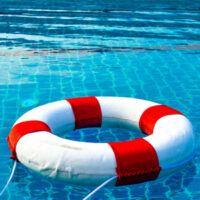Decoding The Residential Swimming Pool Safety Act

For those who are lucky enough to have them, residential swimming pools can be lifesavers for families trying to stay active, especially during the COVID-19 pandemic. However, they can also be dangerous if they are not properly maintained, particularly for children. If you or a loved one is injured in someone else’s private pool, know that you do have rights in terms of seeking compensation if you believe that there was negligence or recklessness involved.
Drownings Common
Because of the prevalence of private pools in Florida, the legislature passed the Residential Swimming Pool Safety Act (RSPSA) in 2000 after statistics showing high frequency of drownings, especially in very young children – the state has consistently been among the nation’s leaders in drowning deaths for children aged 1-4. As a result, backyard pool owners are required to uphold certain safety standards, with a failure to do so punishable by fines and potential civil liability is injured on their property.
In order to pass state inspection, a residential pool must have at least one safety feature installed that meets the criteria specified in the relevant statute. The options are:
- A barrier to isolate the pool from the rest of the property, which has to meet certain criteria in terms of height and strength;
- An ‘approved’ pool cover;
- Any door or window providing direct access to the pool having an alarm attached where the sound reaches a certain decibel level;
- Any door providing direct access to the pool having a “self-closing, self-latching” device, where the release mechanism is at least 54 inches off the ground; and/or
- A pool alarm which sounds at a certain decibel level when there has been an unauthorized entry into the pool.
Safe Pools Are The Point
Installing safety features as required by the RSPSA is not intended to be burdensome, but some pool owners either neglect to install them or simply choose not to, for reasons of their own. However, if you are ever in a position where someone is injured in your pool, and you do not have proper safety equipment in place, you may face legal problems. Failure to have a safety device installed is a second-degree misdemeanor, which carries a jail term of 60 days.
That said, Florida law does allow a person 45 days from the date of the arrest or summons to try and remedy the defect. If they can do so, the criminal charge will be dropped, because the legislative intent of the RSPSA is not to criminalize behaviors; rather, the point of the law is to push the public to make their residential swimming pools safer. The remedy for serious injury should lie in the civil system, which is where you file suit seeking monetary compensation for the harm that you or your loved one may have suffered.
Contact A Tampa Personal Injury Lawyer
As the weather begins to get warmer again, more and more Floridians are getting back into their pools, but it is crucial that they do so safely. If you or someone you love has been injured in a private pool, and you believe that the negligence of the owner played a role, calling a Tampa personal injury attorney is a good idea. The Rinaldo Law Group can offer knowledgeable and dedicated representation that can help in a difficult time for your family. Call our offices today for a free consultation.
Resource:
leg.state.fl.us/statutes/index.cfm?App_mode=Display_Statute&URL=0500-0599/0515/0515.html
https://www.tampainjuryaccidentlaw.com/my-child-has-been-injured-what-do-i-do/












